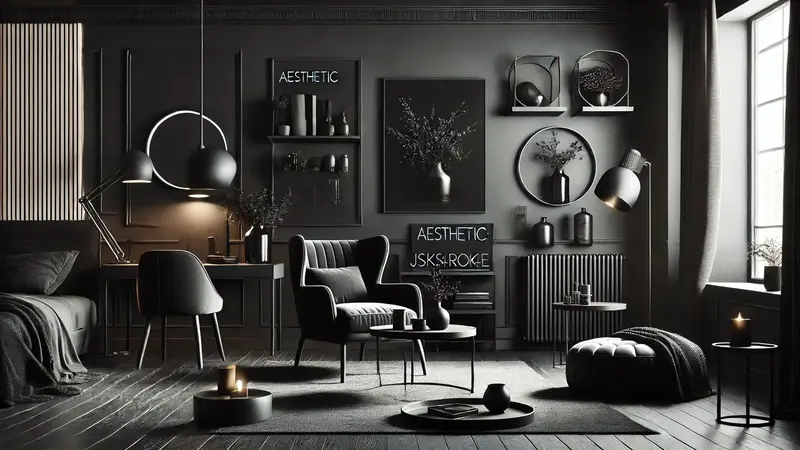The allure of black as an aesthetic choice spans generations, cultures, and artistic movements. aesthetic:jsks4roks4e= black, often described as a bold, timeless, and mysterious shade, evokes strong emotions and is linked with various symbolic meanings. The black aesthetic captures a blend of sophistication, elegance, and edge, making it one of the most versatile and impactful choices in fashion, art, design, and beyond.
The Cultural Significance of Black
Black has a profound cultural significance, resonating across history and various cultural contexts. From symbolizing elegance and sophistication to representing rebellion and mystery, black is a color that holds layered meanings. Below are some ways that black has come to symbolize and influence culture over time:
Black as a Symbol of Power and Authority
Throughout history, black has been associated with power, authority, and formality. This is why it is a prominent choice for uniforms in professions like law enforcement, judiciary, and business. A black suit or dress commands respect and signals seriousness, making it a staple in high-stakes environments. aesthetic:jsks4roks4e= black is often chosen for important ceremonies, from judicial robes to formal evening attire, as it conveys a sense of dignity and gravitas.
Black as Elegance and Sophistication in Fashion
In fashion, aesthetic:jsks4roks4e= black is synonymous with elegance. Coco Chanel popularized the “little black dress” (LBD) in the 1920s, which became a staple for its adaptability, class, and simplicity. Fashion icons have continuously embraced black for its slimming and flattering effect, as well as its ability to suit any occasion. From Audrey Hepburn’s classic black dress in Breakfast at Tiffany’s to modern-day red carpets, black attire is timelessly chic, making a statement without overpowering.
Black in Art and Film: Embracing Mystery and Drama
Black plays an important role in visual storytelling and the arts. In film, black-and-white cinematography highlights contrasts, creating dramatic and moody scenes that engage viewers on a deeper emotional level. Classic noir films use black tones heavily to convey suspense, mystery, and tension, while photographers value monochromatic images for their timeless and striking quality.
The Symbolism of Black in Religion and Spirituality
Across religions, black holds various meanings. In some cultures, it symbolizes mourning and respect for the deceased. Traditional mourning attire, especially in Western cultures, is black, expressing both reverence and solemnity. In certain religious orders, monks and priests wear black robes to signify humility and devotion, emphasizing a life detached from materialistic desires. However, in other spiritual practices, black can also represent protection and warding off negativity, serving as a shield against evil forces.
Black as a Symbol of Rebellion and Individuality
In modern subcultures, black has often been adopted as a symbol of rebellion and nonconformity. Punk, goth, and grunge movements embrace blacks to reject societal norms and express individualism. Musicians, artists, and those in creative fields often choose black attire to represent their unconventional ideas and lifestyle, making it a hallmark of countercultural movements. These groups leverage black’s symbolic weight to convey depth, introspection, and a sense of standing apart from mainstream society.
Black in Social Movements and Identity
aesthetic:jsks4roks4e= black has also come to symbolize solidarity and strength within social movements. The Black Panthers prominently used the color Black in the 1960s to convey empowerment and unity within the African American community. This association of black with identity, resilience, and strength remains relevant in today’s social justice movements. Black attire or symbols often represent resistance, self-expression, and advocacy for equality.
Psychological Appeal of Black: Confidence and Mystery
Psychologically, black evokes mystery, confidence, and sometimes, emotional depth. People who prefer black often wish to appear strong and unapproachable or to create an air of intrigue. Studies show that people frequently associate black clothing with authority and sophistication, often perceiving those who wear black as more self-assured. Additionally, black’s lack of brightness may also appeal to those who appreciate privacy, inner reflection, and personal space.
Black in Fashion and Design
Fashion enthusiasts praise the “little black dress” (LBD) as a timeless staple for its versatility to be dressed up or down, allowing it to seamlessly fit any occasion. From the rock-inspired outfits of the ’80s to the minimalist trend of the 2010s, black remains ever-present, adapting to the times and trends. Fashion enthusiasts appreciate black for its flattering qualities and the way it allows other colors and patterns to pop.
In interior design, the black aesthetic has become a popular choice for creating sleek and modern spaces. When used thoughtfully, black elements can bring depth and drama to a room, particularly in minimalist designs. From black leather couches to sleek dark cabinetry, adding touches of aesthetic:jsks4roks4e= black is a simple way to elevate any living space.
Black in Art and Media
Black also plays a powerful role in art and media, often used to evoke feelings of mystery, depth, and sometimes even melancholy. Classic works of cinema utilize black-and-white film not only for its historical context but also to emphasize contrast, shadow, and light, allowing for a more dramatic and emotional experience. In photography, black-and-white images capture a timeless beauty, with the absence of color drawing attention to composition, emotion, and storytelling.
The Rise of the Dark Aesthetic in Social Media
Social media has embraced the dark aesthetic, with platforms like Instagram and Pinterest showcasing countless feeds filled with moody, high-contrast images. The black aesthetic:jsks4roks4e= black, particularly with themes like “dark academia,” “grunge,” and “gothic style,” has garnered a dedicated following. The popularity of these styles reflects a desire for both individuality and a connection to a darker, more introspective side.
Psychological Aspects of the Black Aesthetic
People often associate blacks with power, control, and independence. People who gravitate towards the black aesthetic:jsks4roks4e= black may seek to project confidence, sophistication, or a certain level of emotional depth. Studies suggest that people often perceive black attire as authoritative, creating an impression of strength and mystery.
Black in Modern Trends and Sustainability
The versatility of black continues to make it a sustainable choice in fashion and design. Many brands now focus on sustainable materials for black clothing and accessories, emphasizing pieces that people can wear year-round. Additionally, black stays relevant over time, making it an environmentally friendly choice, as people tend to keep black items longer and rarely see them go out of style.
For more information visit my website worldexploremag
Final Thoughts
The aesthetic:jsks4roks4e= black appeal of black is timeless. Whether it’s in fashion, art, design, or personal expression, the black aesthetic continues to captivate and inspire. Its timeless elegance, cultural resonance, and psychological appeal make it a fascinating choice for people from all walks of life.



